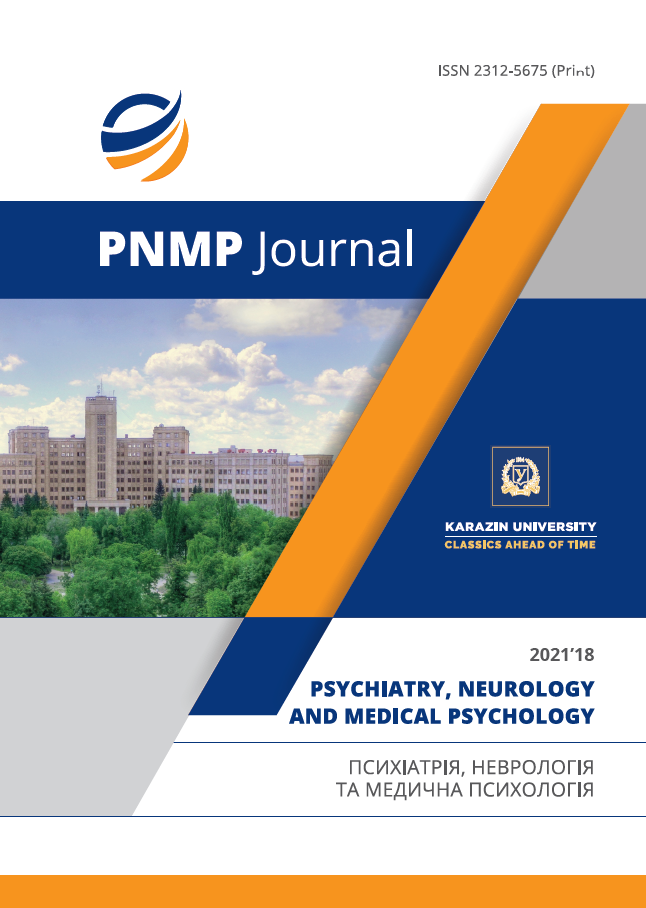Characteristics of cognitive impairment in multiple sclerosis patients depending on different risk factors
Abstract
Cognitive impairment (CI), along with motor deficit, is a crucial component of a disability aggravation in multiple sclerosis (MS) patients. The aim of this study was to asses characteristics of CI in separate cognitive domains depending on socio-demographic (age, sex, level of education), disease parameters (severity, course type and disease duration) and external factors (smoking). The current study enrolled 137 MS patients (102 women and 35 men) aged from 22 to 69 years. All participants were divided into two groups depending on the disease course: group А – patients with relapsing-remitting (RR-MS) type (n=106) and group B – participants with progressive forms of the disease (n=31). The following study discovered that disruption of separate cognitive domains was present even without the apparent CI according to MоCA (Montreal Cognitive Assessment): executive functions impairment (p=0,0013) was found most frequently in case of RR-MS, and memory (p=0,0233) decline in case of progressive forms. In the group A moderate CI were associated with decrease of memory (p<0,0001), attention (p=0,0061), executive functions (p=0,0005), language (p=0,0080) and abstract thinking (p=0,0018); severe CI – with disorders of attention (p=0,0055), language (p<0,0001) and abstract thinking (p=0,0144). As for the group B, moderate CI were associated with decline of abstract thinking (p<0,0001), and severe CI – with impairment of memory and executive functions (p=0,0337). Level of physical disability and smoking impact CI independently of MS course, meanwhile, presence of higher education proves to be beneficial for preserving cognitive functions. In addition, disease duration, number of exacerbations and male gender (concerning attention decline) can affect cognition in relapsing-remitting course of MS.
Downloads
References
Lakin L., Davis B.E., Binns C.C. et al. Comprehensive Approach to Management of Multiple Sclerosis: Addressing Invisible Symptoms – A Narrative Review. Neurol Ther. 2021. No. 10, pp. 75–98. https://www.doi.org/10.1007/s40120-021-00239-2
Walton V., King R., Rechtman L., Kaye W., Leray E., Marrie R.A., Robertson N., La Rocca N., Uitdehaag B., van der Mei I., Wallin M., Helme A., Napier C.A., Rijke N., Baneke P. Rising prevalence of multiple sclerosis worldwide: Insights from the Atlas of MS, third edition. Multiple Sclerosis Journal. 2020. No. 14, pp. 1816-1821. https://www.doi.org/10.1177/1352458520970841
Bass, A. D., Van Wijmeersch, B., Mayer, L., Mäurer, M., Boster, A., Mandel, M., Mitchell, C., Sharrock, K., & Singer, B. Effect of Multiple Sclerosis on Daily Activities, Emotional Well-being, and Relationships: The Global vs MS Survey. International journal of MS care. 2020. No. 22(4), pp. 158–164. https://www.doi.org/10.7224/1537-2073.2018-087
Giedraitiene N., Kaubrys G., Kizlaitiene, R. Cognition During and After Multiple Sclerosis Relapse as Assessed With the Brief International Cognitive Assessment for Multiple Sclerosis. Scientific reports. 2018. No. 8(1), p. 8169. https://www.doi.org/10.1038/s41598-018-26449-7
Brochet B., Ruet A. Cognitive Impairment in Multiple Sclerosis With Regards to Disease Duration and Clinical Phenotypes. Front Neurol. 2019. No. 20(10), p. 261. https://www.doi.org/10.3389/fneur.2019.00261
Sadigh-Eteghad S., Abbasi Garravnd N., Feizollahi M., Talebi M. The Expanded Disability Status Scale Score and Demographic Indexes Are Correlated with the Severity of Cognitive Impairment in Multiple Sclerosis Patients. Journal of clinical neurology (Seoul, Korea). 2021. No. 17(1), pp. 113–120. https://doi.org/10.3988/jcn.2021.17.1.113;
Amato M. P., Prestipino E., Bellinvia A., Niccolai C., Razzolini L., Pastò L., Fratangelo R., Tudisco L., Fonderico M., Mattiolo P. L., Goretti B., Zimatore G. B., Losignore N. A., Portaccio E., Lolli F. Cognitive impairment in multiple sclerosis: An exploratory analysis of environmental and lifestyle risk factors. PloS one. 2019. No. 14 (10). e0222929. https://doi.org/10.1371/journal.pone.0222929
Thompson A.J., Banwell B.L., Barkhof F., Carroll W.M., Coetzee T., Comi G., Correale J., Fazekas F., Filippi M., Freedman M.S., Fujihara K., Galetta S.L., Hartung H.P., Kappos L., Lublin F.D., Marrie R.A., Miller A.E., Miller D.H., Montalban X., Mowry E.M., Sorensen P.S., Tintoré M., Traboulsee L., Trojano M., Uitdehaag B.M.J., Vukusic S., Waubant E., Weinshenker B.G., Reingold S.C., Cohen J.A. Diagnosis of multiple sclerosis: 2017 revisions of the McDonald criteria. The Lancet Neurology. 2018. No. 17, pp. 162-173. https://doi.org/10.1016/S1474-4422(17)30470-2
Kurtzke J.F. Rating neurological impairment in multiple sclerosis: an expanded disability status scale (EDSS). Neurology. 1983. No. 3, pp. 1444-1452. https://doi.org/10.1212/WNL.33.11.1444
Nasreddine Z.S., Phillips N.A., Bédirian V., Charbonneau S., Whitehead V., Collin I., Cummings J.L., Chertkow H. The Montreal Cognitive Assessment, MoCA: a brief screening tool for mild cognitive impairment. Journal of American Geriatric Society. 2005. No. 53, pp. 695–699. https://doi.org/10.1111/j.1532-5415.2005.53221.x
Brochet B., Ruet A. Cognitive Impairment in Multiple Sclerosis With Regards to Disease Duration and Clinical Phenotypes. Front Neurol. 2019. No. 20(10), p. 261. https://doi.org/10.3389/fneur.2019.00261
Ruano L., Portaccio E., Goretti B., Niccolai C., Severo M., Patti F., Cilia S., Gallo P., Grossi P., Ghezzi A., Roscio M., Mattioli F., Stampatori C., Trojano M., Viterbo R.G., Amato M.P. Age and disability drive cognitive impairment in multiple sclerosis across disease subtypes. Mult Scler. 2017. No. 23(9), pp. 1258-1267. https://doi.org/10.1177/1352458516674367
Donaldson E, Patel VP, Shammi P, Feinstein A. Why Sex Matters: A Cognitive Study of People With Multiple Sclerosis. Cogn Behav Neurol. 2019. No. 32(1), pp. 39-45. https://doi.org/10.1097/WNN.0000000000000188
Pérez-Miralles F., Prefasi D., García-Merino A., Ara J.R., Izquierdo G., Meca-LallanaV., Gascón-Giménez F., Martínez-Ginés M.L., Ramió-Torrentà L., Costa-Frossard L., Fernández O., Moreno-García S., Medrano N., Maurino J., Casanova B. Short-term data on disease activity, cognition, mood, stigma and employment outcomes in a cohort of patients with primary progressive multiple sclerosis (UPPMS study). Multiple Sclerosis and Related Disorders. 2021. No. 50. https://doi.org/10.1016/j.msard.2021.102860
McKay K.A., Manouchehrinia A., Berrigan L., Fisk J.D., Olsson T., Hillert J. Long-term cognitive outcomes in patients with pediatric-onset vs adult-onset multiple sclerosis. JAMA Neurology. 2019. No. 76(9), pp. 1028-1034. https://doi.org/10.1001/jamaneurol.2019.1546
Migliore S., Ghazaryan A., Simonelli I., Pasqualetti P., Squitieri F., Curcio G., Landi D., Palmieri M.G., Moffa F., Filippi M.M., Vernieri F. Cognitive Impairment in Relapsing-Remitting Multiple Sclerosis Patients with Very Mild Clinical Disability. Behavioural Neurology. 2017. https://doi.org/10.1155/2017/7404289
Elshebawy, H., Fahmy, E.M., Elfayoumy, N.M. et al. Clinical predictors to cognitive impairment in multiple sclerosis patients. Egypt J Neurol Psychiatry Neurosurg. 2021. No. 57, p. 38. https://doi.org/10.1186/s41983-021-00292-6

